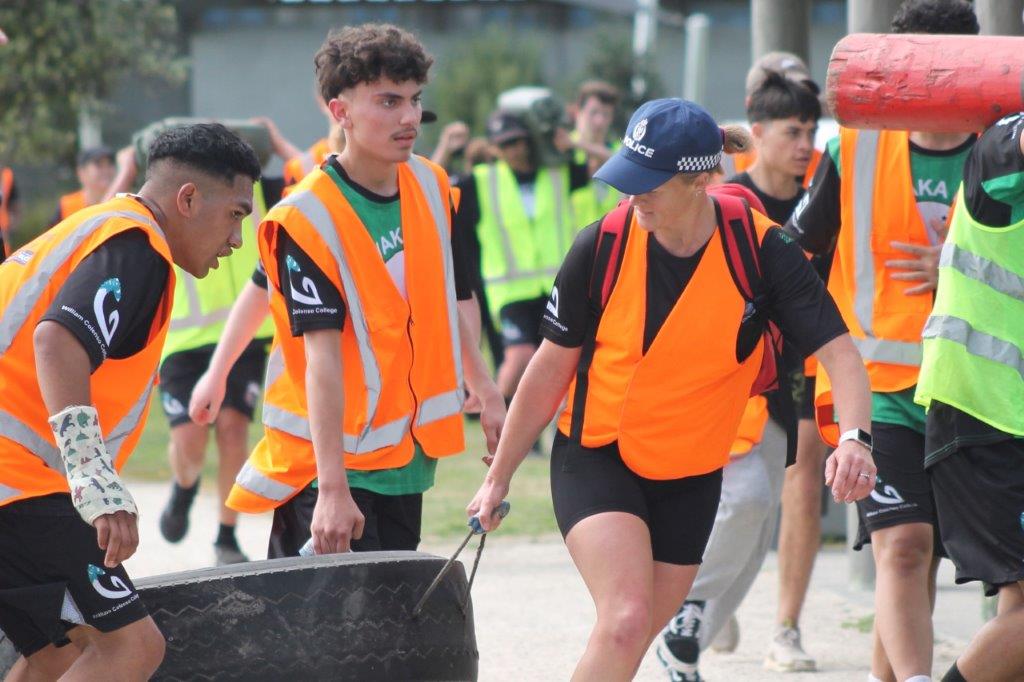I’m an early riser. I’m happy to get out of bed at dawn and into some exercise.
But throw in instructors yelling and impossibly heavy objects (think telephone pole, think truck tyre) and it takes more than an early morning habit to motivate me.
One of my recent physical challenges has been participating in Te Vaka Māia. It’s been the comeraderie that’s got me out of bed. I’ve been humbled by the rangatahi who are the principal participants in the programme, and now that I’ve done it once I’m hooked and I can’t wait to do it again next year.
Te Vaka Māia is an eight-week course open to Year 10 to 13 students at William Colenso College. It entails three training sessions a week, all starting before 6am. It culminates in ‘The Longest Day’, a gruelling 8-hour, non-stop, 30km urban run through Napier – including a stint up Mataruahou – carrying the aforementioned tyre and pole as well as 20 litre water cans.
As if that’s not enough, the finale is to pull a unimog down the road and through the school gates. It’s impossible without team work. That includes the other ‘team members’ – the families and wider community – who are there at the end of The Longest Day cheering on a bunch of young people doing positive things together.
Alongside the teens taking part are adult helpers to support and encourage them. I found fairly early on though that it’s the kids who bring the encouragement. They inspired, motivated and supported me so much just by being their authentic, honest and complete selves in this incredibly demanding but uplifting experience.
Part boot-camp, part personal challenge TVM has been running since 2012 and since then 500 kids have taken part. This year was my first time being involved but I’ll be back. Kids from different walks of life turn up year after year, some return and take part two or three years in a row. Its longevity and the successful outcomes seen in participants prove it’s a winning formula. It’s transformational and builds mental resilience. And it has a lasting impact for the participants because it helps them see another side of life.
In many ways the physical parts of TVM are inconsequential. Instead it’s about self development, and not giving up, no matter how much you’re hurting. It’s about committing to something and seeing it through, teamwork and communication, the realisation that we can’t do difficult things on our own, we need to rely on others and help out where we’re needed too.
I would love to see TVM grow and extend to other schools; every school would benefit. But it takes a huge support network to make it happen successfully. And it takes money – about $20,000 a year. Each year 30 kids participate supported by ten police officers, a group of volunteers from Te Kupenga Hauora who help out as medics and catering crew, and school staff who volunteer their time. All these little jobs, done by lots of dedicated people, add up to a huge behemoth that delivers so much to the kids who take part.
I was asked to be involved to be a support to the rangatahi, but it was a huge learning experience for me too. I’m left asking “What can we do as adults to really support our young people?” Doing things for them is not the answer. Instead we need to take a step back and let them work things out for themselves, try things, and if they fail turn around, rethink, reset and have another go.
That’s how the rangatahi in TVM get the most out of the experience, not through us ploughing a pathway for them, but by giving things a go. They know we are right there, on the sidelines, ready to help when they really need it.
For every one of the participants you can see them working through their own personal challenges. Every one of them has a strength, and a weakness. Learning to ask for help and also helping when they are needed is key. The sense of pride I saw when they had dug deep and supported each other was hugely rewarding to witness.
The culture of TVM, adapted and solidified over ten-plus years, is very important. There’s an ownership and a responsibility from those who run the programme – teachers and police together. Having the right people involved is what makes it work, and I feel privileged to be part of that culture now, and those people, because I am a better person for it.


Wow, Kirsten. Great respect for your involvement in that kaupapa. Thanks for sharing